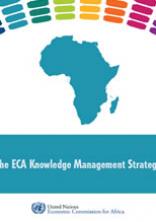The ECA Knowledge Management Strategy

Over the recent years, global socioeconomic and political dynamics have opened up historic and unprecedented opportunities for African nations. To achieve the promised breakthroughs in economic growth, social development and environmental sustainability, African policymakers need sound, well founded advice to ground national decision making.
In this context, the Executive Secretary, Mr. Carlos Lopes, in consultation with the staff at large, has taken a strategic refocusing of the organization. ECA’s 2013-2015 Business Plan intends the Commission “to become the think tank of record on matters pertaining to African development”, at the forefront of providing the continent’s leaders with advice based on reliable data and in-depth research, leading to better decision-making and policy direction for stimulating Africa’s economic future and transformation. To reach this goal, the Executive Secretary commissioned a reprofiling process to examine ECA’s roles, functions, structures and systems, and to realign them to reflect the new realities of the African transformative development agenda. The work was carried out over 2013, and implementation has begun with the 2014-2015 biennium.
Among the key features of the reprofiling was the creation of a new Division for Public Information and Knowledge Management, bringing together four sections having strategic responsibilities for improving ECA’s visibility and impact – communications, publication, ICT, and knowledge and library services. One of the challenges for this new Division – and to its Knowledge and Library Services Section in particular – is to ensure that knowledge flows are consistently incorporated into the business of the organization, so that ECA can become the premier think tank it aspires to be.